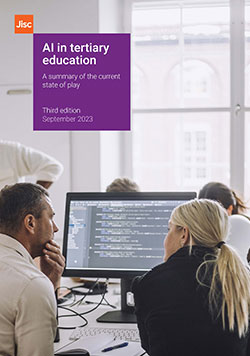Artificial intelligence (AI) in tertiary education
In this third edition we summarise the current state of play, including insights into emerging use cases and guidance on ethical considerations.

About the report
The last twelve months have seen huge changes in the impact of AI in education, starting, for most, with the release of ChatGPT in November 2022. Concerns about academic integrity and the future of assessment dominated early debates, and still pose many issues.
The debate quickly grew to cover ways of harnessing the power of generative AI, to reduce workload and to find new and exciting ways of using it in learning and teaching. The issue of impact of AI on the workforce soon came to the fore, with debate about ensuring employability of students and preparing them for an AI-powered workplace. We are probably still at the very beginning of this journey.
It's easy to forget that before ChatGPT we were already seeing AI delivering real value in education. In the UK, we are seeing early adopters successfully use AI services for the benefit of students and the college or university. These include Bolton College’s Ada and FirstPass, adaptive learning with CENTURY Tech at Basingstoke College of Technology, the Beacon digital coach in Staffordshire University, and the Taylor digital assistant in the Open University. Internationally, this is evident with the use of CogBooks in Arizona State University or, at a much larger scale, SquirrelAi in China. Generative AI has put a rocket booster under this.
We hope that by regularly summarising the state of AI educational technologies we are providing context and ideas for colleges and universities to explore this further. AI is not without its challenges - be those legal, ethical or technical – and progress towards digital transformation is likely to be problematic if we are solely reacting to external technology drivers.
There are now strong foundations to enable further adoption of AI in colleges and universities, and to face the challenges and opportunities presented by the relentless pace of AI advances we are currently seeing.
"Generative AI poses substantial challenges to education, not least to assessment, but it also provides opportunities for supporting learners and learning. Unsurprisingly it has also acted as a stimulus for the education sector to examine all aspects of what and how it teaches and to re-evaluate assessment practices, things that have remained largely static for a very long time."
Heidi Fraser-Krauss, chief executive officer, Jisc
Read the full report
pdf, 6.6k, 41 pages
Artificial intelligence
We've developed a new centre to lead the way for artificial intelligence (AI) in education, coordinating the efforts at colleges and universities and focusing on practical help and implementation. Find out more and explore our collection of AI demos.